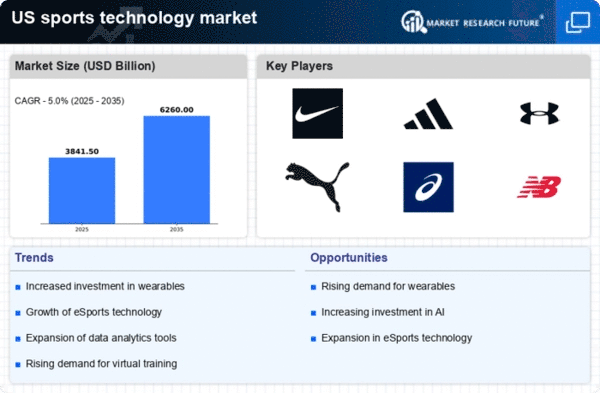Rise of E-Sports and Gaming Technologies
The emergence of e-sports has significantly impacted the sports technology market, creating new opportunities for technology integration and fan engagement. With the e-sports industry projected to generate revenues exceeding $1.5 billion in the US by 2025, traditional sports organizations are increasingly investing in gaming technologies to attract younger audiences. This trend indicates a shift in how sports are consumed, with technology playing a crucial role in enhancing the viewing experience. As e-sports continue to grow, the sports technology market is likely to adapt, incorporating elements such as augmented reality and interactive platforms to engage fans and players alike.
Increased Investment in Sports Technology
The sports technology market is experiencing a surge in investment from various stakeholders, including teams, leagues, and private investors. This influx of capital is primarily directed towards innovative technologies that enhance performance, safety, and fan engagement. In 2025, investments in sports technology are projected to reach approximately $10 billion in the US alone, reflecting a growth rate of around 15% annually. This financial commitment indicates a strong belief in the potential of technology to transform the sports landscape. As organizations seek to gain a competitive edge, the focus on advanced analytics, wearable devices, and virtual reality solutions is likely to intensify, further propelling the sports technology market forward.
Growing Demand for Performance Optimization
Athletes and teams are increasingly prioritizing performance optimization, driving the sports technology market to develop solutions that enhance training and competition outcomes. Technologies such as biomechanical analysis tools, wearable sensors, and AI-driven coaching platforms are gaining traction. In 2025, the market for performance optimization technologies is expected to account for over 30% of the overall sports technology market in the US. This trend suggests that stakeholders are recognizing the importance of data-driven insights in improving athletic performance. As a result, the sports technology market is likely to see continued innovation in this area, with a focus on personalized training regimens and injury prevention strategies.
Advancements in Health and Safety Technologies
Health and safety remain paramount in the sports industry, prompting the sports technology market to innovate in protective gear and injury prevention solutions. Technologies such as smart helmets, impact sensors, and advanced monitoring systems are being developed to enhance athlete safety. In 2025, the market for health and safety technologies is anticipated to represent a substantial portion of the sports technology market, driven by increasing awareness of athlete welfare. This focus on safety not only protects athletes but also enhances the overall integrity of sports, suggesting that the sports technology market will continue to prioritize health-related innovations.
Integration of Artificial Intelligence in Sports
Artificial intelligence (AI) is becoming a transformative force within the sports technology market, influencing various aspects from player analytics to fan engagement. AI-driven solutions are being utilized to analyze player performance, predict outcomes, and enhance the overall spectator experience. By 2025, the adoption of AI technologies in the sports sector is expected to grow significantly, with estimates suggesting that AI could account for nearly 20% of the sports technology market. This integration indicates a shift towards more data-centric decision-making processes, allowing teams and organizations to leverage insights for strategic advantages. As AI continues to evolve, its impact on the sports technology market is likely to expand, fostering innovation and efficiency.















